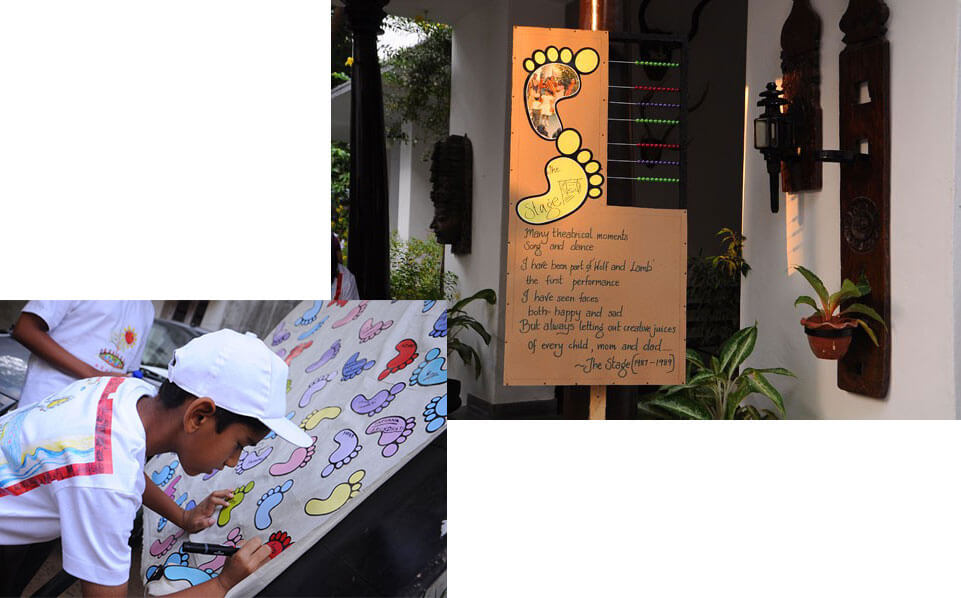Montessori Method
November 19, 2023 2024-01-23 2:54Montessori Method
Overview

Montessori observed 4 distinct periods, or "planes" in human development extending
- from birth to 6 years
- 6-12 years
- 12-18 years
- 18-24 years
Montessori In India
Abacus' commitment to Montessori
Kamini Sundaram founded Abacus Montessori School in 1987. At this time there were no Montessori schools in Chennai. Parents had little or no knowledge or awareness of Montessori and our first trained teachers Shobhana Vaidyanathan and Uma Shanker found us when they moved into Madras from other cities. From a small beginning Amukta Mahapatra, the school’s First Principal built a committed team.
In 1989 she conceived of a Montessori Conference to mark 50 years of Montessori in India which Abacus convened in Kalakshetra, Chennai. The organizing committee comprised of S.R.Swamy, Bangalore, Meenakshi Sivaramakrishnan, Bangalore, Shirley Madhavan Kutty, New Delhi, Tapati Gupta, Calcutta, Leela Agarwal, Hyderabad, C.Nachiappan, Chennai, Kamini Sundaram, Chennai, Amukta Mahapatra, Chennai.
The conference called to Montessorians from across the country and other parts of the world, many of whom attended. Many scholars of eminence and Montessorians were speakers at the convention – Dr.Mario Montessori Jr, Netherlands, Gool K.Minwalla, Pakistan, Dipti Devi, Calcutta and Radha Nagaraj, Bangalore. The conference was organized with the help of parents, teachers and volunteers.
Abacus continued to maintain ties with Indian Montessori Centre (IMC), Bangalore and Meenakshi Sivaramakrishnan, Director of Training, especially as Uma Shanker had moved on from Abacus to set up her own teacher training centre (CMT-C) in Chennai under the auspices of Indian Montessori Centre. Shobhana Vaidyanathan became Director of Training at CMT-C in July 2010.
In February 2001 Abacus was the venue of Conference 2001, Chennai conducted by the Indian Montessori Centre, Bangalore. The Conference attracted 350 delegates from all over the country and further strengthened and spread awareness of Montessori education.
In 2002 Abacus collaborated with Prof. Rajendra Gupta, head of Indian Institute for Montessori Studies, Bangalore to conduct a training course for teachers in the Montessori Method for 6-12 year olds. The course was anchored by Amukta Mahapatra. Those who trained were all the Primary (6-9) and Elementary (9-12) teachers at Abacus as well as 18 outside participants.
In October 2006 Abacus founded an infant community with Shankari Raveendran known as Starlight Abacus which ran till April 2011.
Kamini Sundaram became member of the Board of Association Montessori Internationale (AMI), Amsterdam in April 2008 up to April 2011 and played a key role in the formation and organization of the 26th International Montessori Congress and Indian Montessori Foundation.
The 26th International Montessori Congress was conducted in Chennai in January 2009. The Congress took place in Kalakshetra in January 2009 conducted under the auspices of Association Montessori Internationale, Amsterdam. Abacus, along with other Montessori schools in Chennai, played an integral role in supporting the organization of the Congress. The Congress brought together participants from 39 Countries and many eminent speakers from India and abroad.
The members of the organizing committee were Leela Samson, Director, Kalakshetra Foundation, Chennai, Rukmini Ramachandran, Director of Training, Navadisha Montessori Institute, Chennai, Ruby Lau, AMI Trainer, UK, Govind Venkatesan, Management Consultant, New Zealand, Amukta Mahapatra, Director, Schoolscape Centre for Educators, Zarin Malva, Director of Training, RTI Montessori Course, Mumbai, Lakshmi Krishnakumar, Director of Training, MRTC, Hyderabad and Shirley Madhavan Kutty, Founder-Principal, The Magic Years Montessori Pre-school, New Delhi.
After the Congress, Indian Montessori Foundation, a pan Indian Montessori body affiliated to AMI was formed to work for the awareness and propagation of Montessori education and principles across India through conference, workshops and programs.
Abacus continues to support the training courses in Chennai for observation and teaching practice.
The school’s commitment to Montessori is anchored in its vision to build a school that gives freedom, choice, self directed learning and co-governance to children and adults.


